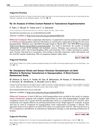 22 citations,
September 1994 in “The Journal of Clinical Endocrinology and Metabolism”
22 citations,
September 1994 in “The Journal of Clinical Endocrinology and Metabolism” Finasteride reduces dihydrotestosterone, increases testosterone, and may treat hirsutism in women.
[object Object] 19 citations,
March 1994 in “Fertility and sterility” The combination therapy reduced hirsutism in women with PCOD and was well-tolerated.
 10 citations,
January 2000 in “PubMed”
10 citations,
January 2000 in “PubMed” Both finasteride and GnRH agonist treatments reduced hair growth in women with idiopathic hirsutism, but GnRH agonist was more effective.
 2 citations,
December 1994 in “The Journal of clinical endocrinology and metabolism/Journal of clinical endocrinology & metabolism”
2 citations,
December 1994 in “The Journal of clinical endocrinology and metabolism/Journal of clinical endocrinology & metabolism” The treatment effectively reduced hair growth and was safe for patients with PCOS, but it needs better bleeding control.
 30 citations,
August 1992 in “The Journal of Clinical Endocrinology and Metabolism”
30 citations,
August 1992 in “The Journal of Clinical Endocrinology and Metabolism” Finasteride doesn't affect hormone levels in normal men.
 10 citations,
April 1976 in “Archives of Dermatology”
10 citations,
April 1976 in “Archives of Dermatology” A woman's significant hair loss was linked to rapid weight loss and hormone injections.
2 citations,
April 2022 in “Annales d Endocrinologie” Recombinant gonadotropins improve future fertility in CHH patients.
 1 citations,
July 1976 in “Archives of Dermatology”
1 citations,
July 1976 in “Archives of Dermatology” Some women experienced hair loss after stopping chorionic gonadotropin injections and a low-calorie diet.
 74 citations,
January 2006 in “Endocrine journal”
74 citations,
January 2006 in “Endocrine journal” Low-dose gonadotropin treatment is effective for infertility in women with PCOS, leading to high ovulation rates and comparable pregnancy rates with fewer complications.
 11 citations,
December 1987 in “Aesthetic Plastic Surgery”
11 citations,
December 1987 in “Aesthetic Plastic Surgery” The document concludes that the hCG protocol may help in obesity treatment and could be scientifically justified, but more research is needed.
 2 citations,
January 2014 in “International Journal of Endocrinology”
2 citations,
January 2014 in “International Journal of Endocrinology” Women with a certain type of tumor had higher levels of pregnancy hormone and male hormones, which decreased after treatment.
 September 2018 in “The Journal of Urology”
September 2018 in “The Journal of Urology” Clomiphene citrate is a cheap and simple treatment for low testosterone that works as well as human chorionic gonadotropin, alone or combined, especially for men who want to keep their fertility.
[object Object]  October 2023 in “Indian Journal of Ophthalmology - Case Reports”
October 2023 in “Indian Journal of Ophthalmology - Case Reports” Kallmann syndrome can cause eye issues and other health problems, requiring various treatments.
21 citations,
September 1994 in “The Journal of Clinical Endocrinology and Metabolism” 9 citations,
August 1992 in “The Journal of Clinical Endocrinology and Metabolism”  1 citations,
November 2002 in “Endocrine practice”
1 citations,
November 2002 in “Endocrine practice” The patient's high testosterone was reduced by a medication that suppresses gonadotropin.
 989 citations,
August 2007 in “The Lancet”
989 citations,
August 2007 in “The Lancet” PCOS is a complex condition with major health impacts, needing more research for better diagnosis and treatment.
 204 citations,
May 2014 in “The Journal of Sexual Medicine”
204 citations,
May 2014 in “The Journal of Sexual Medicine” Hormone therapy for trans individuals is effective and generally safe in the short term.
 116 citations,
December 2013 in “The Journal of Pediatrics”
116 citations,
December 2013 in “The Journal of Pediatrics” Most youth with gender dysphoria received hormones, had minor complications, and showed a decrease in suicide attempts after treatment.
105 citations,
June 2010 in “The journal of sexual medicine” Testosterone undecanoate increases lean mass and causes various physical changes in female-to-male transsexuals.
79 citations,
December 1990 in “Clinical endocrinology” The testes control steroid production through complex interactions involving various cells and signaling molecules.
 71 citations,
August 2019 in “The journal of sexual medicine”
71 citations,
August 2019 in “The journal of sexual medicine” Testosterone treatment effectively causes male physical development in transgender male adolescents but may lead to side effects like acne, higher BMI and blood pressure, lower good cholesterol, and decreased bone density.
 70 citations,
March 2016 in “Urologic Clinics of North America”
70 citations,
March 2016 in “Urologic Clinics of North America” The document explains how the male reproductive system works, its role in making testosterone, and how conditions like obesity can disrupt it, leading to low testosterone and fertility issues.
 70 citations,
August 1995 in “Fertility and Sterility”
70 citations,
August 1995 in “Fertility and Sterility” Finasteride reduces hairiness and androgen levels in women with unexplained excessive hair growth.
 66 citations,
August 1999 in “The Journal of Clinical Endocrinology & Metabolism”
66 citations,
August 1999 in “The Journal of Clinical Endocrinology & Metabolism” Women with acromegaly often have irregular periods due to hormone imbalances and growth hormone effects.
 57 citations,
January 1995 in “The American journal of medicine”
57 citations,
January 1995 in “The American journal of medicine” Oral contraceptives help treat hyperandrogenic disorders, improving symptoms like excessive hair and acne.
 54 citations,
August 2017 in “Gynecological Endocrinology”
54 citations,
August 2017 in “Gynecological Endocrinology” Lifestyle changes and weight loss are key for treating PCOS-related metabolic issues and infertility, with various medications available for specific symptoms.
 46 citations,
September 2016 in “Clinical, Cosmetic and Investigational Dermatology”
46 citations,
September 2016 in “Clinical, Cosmetic and Investigational Dermatology” Hormonal treatments are effective for severe or persistent acne and should be used with other acne therapies, considering potential side effects.
 36 citations,
May 2017 in “The journal of sexual medicine”
36 citations,
May 2017 in “The journal of sexual medicine” Cyproterone acetate treatment is safe and causes mild feminization, which increases with added estrogen.
 34 citations,
January 2011 in “Fundamental & Clinical Pharmacology”
34 citations,
January 2011 in “Fundamental & Clinical Pharmacology” New treatments for PCOS show promise, but no current medication treats all aspects of the condition.
























